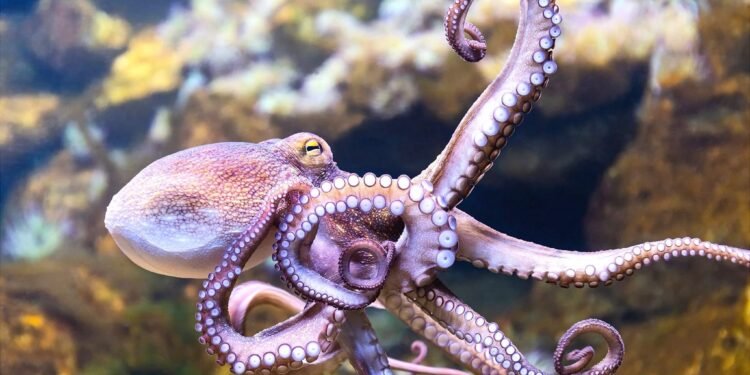When it comes to fascinating sea creatures, the octopus steals the spotlight. These incredible beings, known scientifically as Octopus vulgaris, come in around 300 different species found worldwide. Prepare to be amazed as we delve into the marvelous world of octopuses, exploring everything from their extraordinary teeth to their mind-boggling abilities.
Octopuses are true masters of the “extra.” With their eight arms or tentacles and not just one or two, but three hearts, they never leave us in awe. But that’s not all. These clever creatures possess more than one brain, allowing them to outsmart predators and execute elaborate escape plans. Their habitats range from coral reefs to hidden crevices and mysterious caves beneath the ocean’s surface.
While octopuses are often prey for other sea creatures, they also have an appetite for live prey. This leads us to a burning question: Do octopuses have teeth? Join us as we unravel this intriguing mystery and discover the truth behind the dental secrets of these fascinating creatures.
Do Octopus Have Teeth?
Have you ever wondered related to this query: do octopuses have teeth? Well, the truth is, they don’t! But that doesn’t mean they can’t bite or chew their food. These amazing creatures have found a different way to devour their meals.
Octopuses are carnivores, which means they love feasting on meat. Instead of teeth, they possess sharp beaks that come in handy when it’s time to eat. You might be amazed to learn that these beaks are not exclusive to birds. All cephalopods, including octopuses, have a two-part beak hidden within their jaws.
Imagine an octopus with a beak; it’s quite a unique image! We usually associate beaks with birds, as they are the sharp, protruding parts serving as their mouths. However, cephalopods, like the octopus, have their version of a beak.
This adaptation allows them to gnaw on their food and enjoy their favorite delicacies, often meat and other living vertebrates.
Octopuses belong to a group of highly intelligent marine animals known as cephalopods. They possess remarkable skills for hiding from predators and are easily identified by their tentacles. So, while they may not have teeth, these clever creatures have developed an efficient way to satisfy their appetites and survive in the vast ocean.
Working of Octopus Beak
Do octopuses have teeth? Absolutely! The octopus has a secret weapon called a beak, which it uses for attacking, hunting, and devouring its prey. Picture it as the octopus’ ultimate tool of destruction. When the octopus ensnares it’s unfortunate victim with its long tentacles, it swiftly moves in for the kill using its beak. Like a parrot’s beak, it’s strong and sharp, designed to puncture, shred, and tear through prey effortlessly.
This beak is so mighty that it can even pierce the tough shell of a snail, allowing the octopus to slurp up the critter inside.
Now, the octopus’ mouth is challenging to spot since it’s located at the center where its eight limbs intersect. Despite its hidden nature, this part is a formidable weapon. The octopus’ beak is made of chitin, which is incredibly effective and useful in combat.
It can easily tear flesh apart and crack open the shells of clams and crustaceans. But wait, there’s more! Octopuses also possess salivary glands positioned behind their beaks. These glands produce venom, which is then delivered to their prey through their beaks, adding an extra punch to their attack.
What Are The Different Parts of Octopus Beak?
The mouth of an octopus has two main parts: the upper and the lower. These parts are divided into two layers: the outside layer, called the hood, and the inside layer, called the wall. To keep them together, two movable parts are called the bridge and the shoulder. These parts allow the beak to move like scissors for cutting.
A special tongue called the radula is between the beak and the poison gland. The octopus mainly eats animals that live inside shells, so the radula is used to extract the animal’s body from its shell. It is a muscular tongue with very small teeth on the front side. Just below the radula, there is a good part called the salivary papilla. It acts like a drill and releases a strong chemical that weakens the prey’s shell as it slowly opens the entrance to get inside.
Final Words: Do Octopus Have Teeth?
In conclusion, octopuses do not possess teeth in the traditional sense. Instead, they have a beak-like structure called a “beak” that helps them break down prey. While they lack teeth, their beak is a powerful tool for capturing and consuming their food, making them formidable and fascinating creatures of the ocean.




